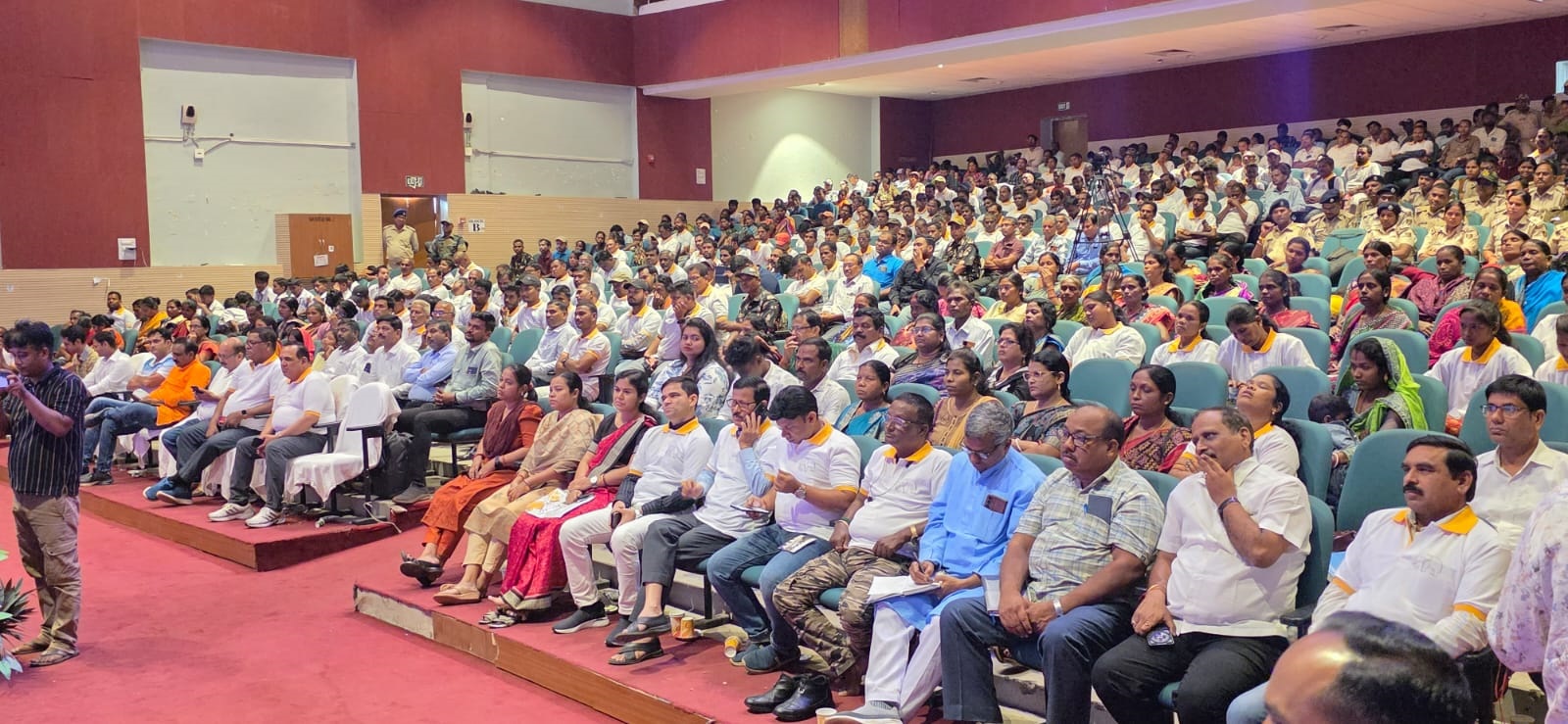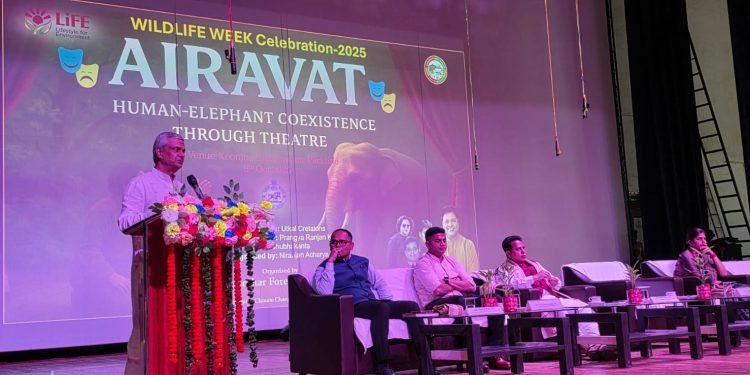Joda/Keonjhar: Wildlife plays a critical role in maintaining environmental balance as well as humans, and only humans can correct their own mistakes, said Dharitri and Orissa POST Editor Tathagata Satpathy while addressing the audience at the 71st National Wildlife Week celebration at the Keonjhar district auditorium, Wednesday.
Gracing the occasion as the chief speaker, Satpathy said rapid human expansion has endangered even the mighty elephants. “Raising awareness and staying aware about our environment is our foremost duty as responsible citizens,” he noted.
Sharing his experiences from attending various “Hati Sabhas” (elephant awareness meetings) across Keonjhar district’s rural areas, Satpathy said he was moved to see that villagers living in elephant-prone zones do not harbour hatred toward the pachyderms. “Patience and mutual trust among villagers have helped reduce human-elephant conflict,” he added.
This planet belongs equally to humans and all living creatures, Satpathy said, emphasising that it is still not too late to protect wildlife. He illustrated the point with an example: In one country, people consume snakes. They did it to such an extent that none were left to control the rat population, disrupting ecological balance. As a result, an increase in rodent population caused concern among the residents. Similarly, elephants being massive wild animals often break high branches and feed on leaves, which in turn helps regenerate forest growth by allowing sunlight to reach the ground. Such natural processes contribute to future afforestation, he said.

He also expressed concern about the alarming rise in plastic pollution, which now affects both land and water. The unchecked use of plastic products has become a serious threat to Earth. However, he noted that the problem can still be solved through collective effort. He urged journalists to write truthfully and raise awareness about environmental conservation among the public.
Telkoi MLA Fakir Mohan Naik, who attended the event as the chief guest, said the government has introduced several schemes for elephant protection and habitat conservation. He emphasised the need to “protect and preserve flora and fauna” to maintain ecological balance. He said the state government has been introducing various conservation programmes, including plantation of bamboo, the favourite food of elephants in their habitats.
Naik added that the government is preparing plans to place underground electric wires in elephant corridors to check frequent power cuts and prevent electrocution incidents. Power lines that are currently at low height will be shifted to higher poles to ensure elephant safety, he said.
Keonjhar Municipality Chairperson Niku Sahu remarked that the earth is limited, but it has space for everyone. Human greed and excessive demand for resources have led to deforestation and illegal encroachment of forest land, disrupting nature’s balance, she said. Sahu added that plastic pollution continues to harm the ecosystem and that the destruction of forests has intensified tension between humans and animals.
Speaking as an invited guest in the meeting, Keonjhar Superintendent of Police Shri Kusalkar Nitin Dagudu said protecting human lives and properties is the duty of the police, while safeguarding wildlife, birds and the environment is the responsibility of the Forest department. He emphasised that coordinated efforts between police and forest officials have led to successful joint raids and arrests of poachers. Illegal mining in forest areas is also being curbed, Kusalkar said.
Installing solar-powered lights and CCTV cameras in forest zones could help track wildlife movements and identify poachers, the SP proposed. He also suggested that training local villagers could help reduce conflicts between humans and wild animals.
Presiding over the programme, Divisional Forest Officer (DFO) Dhanraj HD lauded the “Hati Sabha” meetings organised by Dharitri for their remarkable role in mitigating man-elephant conflict and promoting their coexistence in Keonjhar district. He said incidents of human-elephant conflict are on the rise due to human encroachment and erratic behaviour.
Dhanraj added that the state government provides compensation for loss of life or property due to wildlife attacks. However, in several tribal-dominated villages, lack of awareness often delays reporting such incidents to the department. He said the Forest department also assesses crop losses caused by elephants and provides financial assistance to the affected farmers.
Keonjhar Zilla Parishad member Ashish Chakraborty, while addressed the gathering referred to the Dharitri editorial “Fashi Dia”. Praising the powerful writing of Editor Tathagata Satpathy, Chakraborty said he fully agreed with the article’s central message.
However, he expressed disagreement with the remarks made about journalists in the piece. He said many reporters today write stories that cater to personal interests instead of truth, leading to the suppression of fact-based journalism. He stressed that fearless and unbiased reporting is vital for a healthy democracy.
Sarpanches and samiti members from about 20 panchayats attended the meeting, along with representatives of the Zilla Parishad, Forest department’s Gaja Sathi volunteers, and several men and women working in protection duties. Students were also present.
The event concluded with a stage performance of the play “Airavat” by noted actor Ashrumochan Mohanty and Prajnya.
PNN
Orissa POST – The Best English Newspaper in Odisha






































